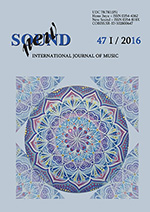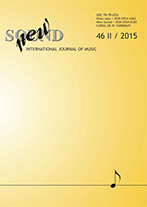Issue No. 40
Composer Speaks
Tijana Popović Mlađenović – NATURE VERSUS CULTURE. Interview with the composer Ivan Brkljačić
Download: ser / eng
A Note from the Editor
Mirjana Veselinović-Hofman –A NOTE FROM THE EDITOR
Download: ser / eng
Core Issue
Sonja Marinković – TWENTY YEARS OF THE COMPOSER SPEAKS SECTION IN THE NEW SOUND MAGAZINE (INTERVIEW AS A METHOD OF MUSICOLOGICAL RESEARCH)
Abstract: This paper presents analyses of the texts published in the Composer Speaks section in the New Sound magazine, on the occasion of the twentieth anniversary of its continual publishing. It sums up the achieved results, and classifies the collected materi- als, with special emphasis on methodology issues concerning the status of the interview as a scientific method, indicating its importance in musicological research. The most significant results are viewed from this perspective, drawing attention to the value of the contributions achieved in the research of Serbian music and the development of Serbian musicology.
Keywords: Novi Zvuk, New Sound, Serbian music, musicology, methodology, interview.
Download: ser / eng
Vesna Mikić – FROM STUDIES TO THEMATIC ISSUES – SYMPTOMS OF TRANSITION/MOBILITY OF THE INTERNATIONAL MAGAZINE FOR MUSIC NEW SOUND
Abstract: The paper presents one possible interpretation of the position, meaning and form of the Studies section as one of the ‘pillars’ of the International Magazine for Music New Sound. The interpretation includes statistical and historical data, as well as theoretical viewpoints used in considerations of the process of transition. Using the Studies section as a case study, two periods in the activity of New Sound have been recognized, and these periods can be brought into relation both with the periods of transition in Serbian society and with the global transition processes which leave their imprint on our professional and social activities.
Keywords: Novi Zvuk, New Sound, the Studies section, studies, thematic issue, transition.
Download: ser / eng
Mirjana Veselinović-Hofman – SECTIONS NEW WORKS AND INTERPRETATIONS IN THE LAST TWENTY YEARS OF THE NEW SOUND MAGAZINE AS THE INDICATORS OF TWO IMPORTANT PRINCIPLES IN MUSICOLOGICAL WORK
Abstract: This item concerns the profile and the contribution of the sections New Works and Interpretations to the recognition of contemporary Serbian music, on the basis of how they have functioned during the past two decades of the International Magazine for Music New Sound. Thereby, these sections can be considered as representative of two crucial principles of the musicological process – analytical and interpretative. It is on the basis of each and on their mutual permeation that different genres of musicological texts origi- nate.
Keywords: New Sound, new works, interpretations, views, musicological genre.
Download: ser / eng
Nenad Ostojić – VIEWS FROM THE ANALYTICAL ANGLE
Abstract: This paper presents a clear insight into the rich diversity of the range of texts published in the Analyses section, which indicates its place in the complete pool of papers published in the International Magazine for Music New Sound during two decades of its existence. The authorial contributions are grouped according to the genre peculiarities of the subject (a musical work or works) with which they deal analytically, and the consideration of the particular features of the chosen analytical angle is focused on concisely conveying the most important defining characteristics of all the published papers.
Keywords: Novi Zvuk, New Sound, analysis, musical genres, formal shaping, structural distinctions.
Download: ser / eng
Studies
Nikola Dedić – PLEADING FOR UTOPIA: AMERICAN PASTORAL IN BOB DYLAN’S MUSIC
Abstract: This paper focuses on the relationship between pop culture, i.e. pop music, and ideology. The main thesis of the text is that the works of pop culture are the product of the social-historical context in which they emerge, but that the same works can also function as a criticism of that very context. As an example, we took Bob Dylan’s media phenom- enon and the elements of utopia as a narrative genre in his work. As a theoretical-interpretative context we relied on the propositions of American analytic philosopher Stanley Cavell: through his ethical theory on ‘moral perfectionism’ an analysis was made of the way in which pop culture functioned as the necessary internal corrective of a democratic community. It is assumed that texts on pop culture cannot be truly revolutionary, but they can certainly be critical.
Keywords: pop culture, pop music, moral perfectionism, utopia, ideology, democracy.
Download: sert / eng
Marija Masnikosa – THE RECEPTION OF MINIMALIST COMPOSITION TECHNIQUES IN SERBIAN MUSIC OF THE LATE 20TH CENTURY
Abstract: This paper aims to present the whole range of different forms of reception of American minimalist composition techniques in the Serbian music in last quarter of the 20th century. Author’s special attention is focused on the fact that the influence of American minimalism (and its techniques) on the Serbian ‘new music’ in this period was ‘divided’ into two branches – one group of the composers strictly followed the achievements of early American (modernist) minimalism, while the other composers created their individual responses to the challenges of American post-minimalism. Also, this paper points to the fact that, unlike the American minimalist genealogy, in which there was a historical continuity connecting the ‘parent’ modernist minimalism with post-minimalism, works of modernist and postmodernist minimalism appeared in the Serbian music of late 20th century almost simultaneously and independently.
Keywords: minimalism, post-minimalism, Serbian music, reception of minimalist composition techniques, discontinuity.
Download: ser / eng
New Works
Robert Kirzinger – ASPECTS OF DUALITY IN ALEKSANDRA VREBALOV’S MILEVA
Abstract: Opposition between dynamically balanced elements is a core idea in art. In Aleksandra Vrebalov’s 2011 opera Mileva, the title character, Albert Einstein’s first wife, is portrayed in a double role that underscores the various conflicts in her life: her status as an aspiring woman physicist in a field (and world) dominated by men, her initially loving but later difficult relationship with Einstein, and the ‘otherness’ of her Serbian heritage. Vrebalov clarifies and intensifies these dualities through the use of dynamic large-scale architecture and an interpretatively rich musical language incorporating quotations and stylistic allusions.
Keywords: contemporary music, opera, Serbian music, Mileva Marić, Albert Einstein, Vida Ognjenović, Aleksandra Vrebalov.
Download: ser / eng
Interpretations
Arnold Berleant – RUMINATIONS ON MUSIC AS AN EXEMPLARY ART
Download: ser / eng
Svetlana A. Mozgot – ONTOLOGY OF SPACE IN CLAUDE DEBUSSY’S SHEET MUSIC
Background. Debussy’s sheet music is a unique phenomenon showing the transformation of musical spatial characteristics into a graphic equivalent. This paper suggests a new elementalist approach to studying the spatial properties of musical sound. This approach enables musicologists and performers to create a new interpretation of sheet music and to discover a new musical content in a score.
Aim: to show techniques which C. Debussy used to fix spatial characteristics in the printed music and to show how the physical properties of space – namely mass, volume and density of sound – become the carriers of the artistic sense in C. Debussy’s notation.
Objectives: to show the technique of marking the sound mass; ways of decreasing the weight of sound; transformation of the mass of sound into the volume of sound and the different density of sound.
Methods of study. We used a musicological analysis to reveal the techniques of sound articulation typical of C. Debussy. The new approach of musicological elementalism was used to study musical sound in terms of its spatial features, namely its mass,


